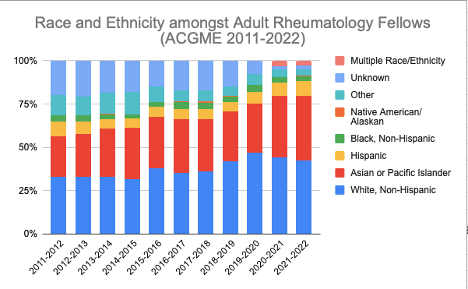Session Information
Session Type: Poster Session C
Session Time: 9:00AM-11:00AM
Background/Purpose: The 2015 American College of Rheumatology Workforce study showed 8 of 1011 adult rheumatologists identified as Black, 85 Hispanic and 3 American Indian or Alaska Native (1). Recent studies show persistent disparities in disease activity and clinical outcomes for minoritized patients versus their White counterparts, including in minoritized patients with Systemic Lupus Erythematosus (2). Diversifying the physician workforce is a necessary strategy to address equity in patient care as URiM (Underrepresented in Medicine) physicians are more likely to work in underserved communities, while also providing diverse perspectives. We investigated the trends of URiM representation, as defined by the Licensing Committee on Medical Education (LCME), among adult rheumatology fellows.
Methods: This is a quantitative analysis of the Accreditation Council for Graduate Medical Education (ACGME) Data Resource Book from 2011 to 2022. This data was publicly available therefore no IRB approval was required. Demographic data including race, ethnicity, and gender of US adult rheumatology fellows were extracted and analyzed in Microsoft Excel. Additionally, a multiracial category was introduced as an option in 2020. Chi-Square test was utilized and expected values were calculated using the 2010 census data (2011) to (2019) and the 2020 US census data for 2020 onwards.
Results: There were 5151 adult rheumatology fellows between 2011-2022. Chi-square analysis demonstrated significant underrepresentation of Black, Hispanic and Native Americans (p < 0.0001) in US adult rheumatology fellowship programs. As seen in figure 1, Three percent of fellows were Black (171/5151), 7% were Hispanic (337/5151), and 0.2% were Native American (11/5151). Although, trend analysis demonstrated a gradual increase in percentage of Hispanic and Black fellows over time, the proportion of URiM adult rheumatology fellows still lags behind the proportion of minority racial/ethnic groups in the US population.
Conclusion: Despite recent increased attention to the importance of diversity in healthcare, the pipeline of adult rheumatology fellows has not shown a significant increase in URiM representation. Actionable and attainable strategies for diversification amongst US adult rheumatology fellows are urgently needed for the workforce to better reflect the rheumatic disease patient population where a greater disease burden is prevalent in minoritized groups. Engaging URiM students in grade school, college and those entering medical school is essential to ensure early and sustained exposure to rheumatology via career awareness, mentorship, and access to research opportunities.
References:
1. Battafarano DF, Ditmyer M, et al. 2015 American College of Rheumatology Workforce Study: Supply and Demand Projections of Adult Rheumatology Workforce, 2015-2030. Arthritis Care Res (Hoboken). 2018 Apr;70(4):617-626. 2. Feldman C.H., Hiraki L.T., Liu J., et. al.: Epidemiology and sociodemographics of systemic lupus erythematosus and lupus nephritis among US adults with Medicaid coverage, 2000-2004. Arthritis Rheum 2013; 65: pp. 753-763.
To cite this abstract in AMA style:
Roca Loor B, Pandit M, Wright T, Etienne M. Room for Racial and Ethnic Diversity in Adult Rheumatology Fellowship Pipeline [abstract]. Arthritis Rheumatol. 2023; 75 (suppl 9). https://acrabstracts.org/abstract/room-for-racial-and-ethnic-diversity-in-adult-rheumatology-fellowship-pipeline/. Accessed .« Back to ACR Convergence 2023
ACR Meeting Abstracts - https://acrabstracts.org/abstract/room-for-racial-and-ethnic-diversity-in-adult-rheumatology-fellowship-pipeline/

